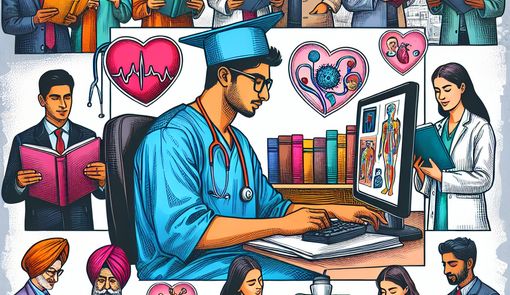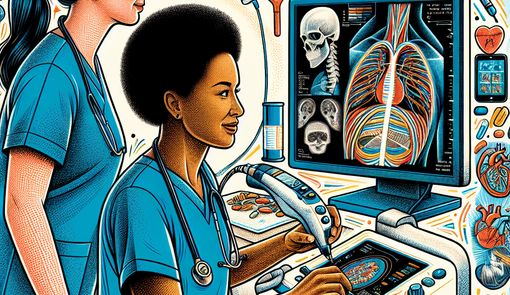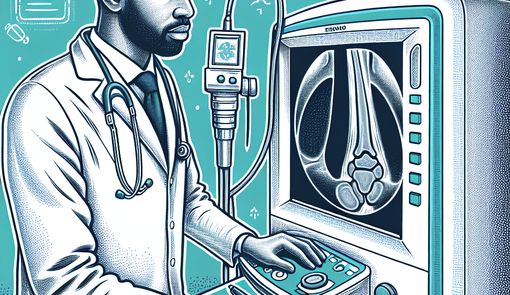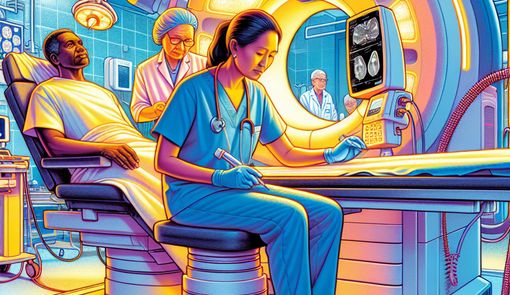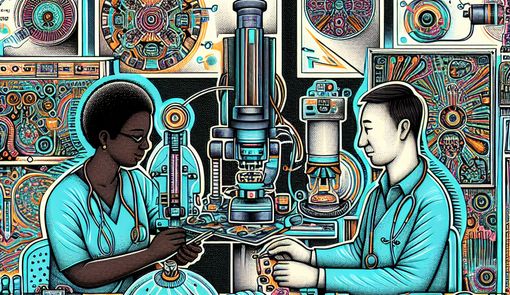Networking for Fluoroscopy Technologists: Tips for Building Professional Connections
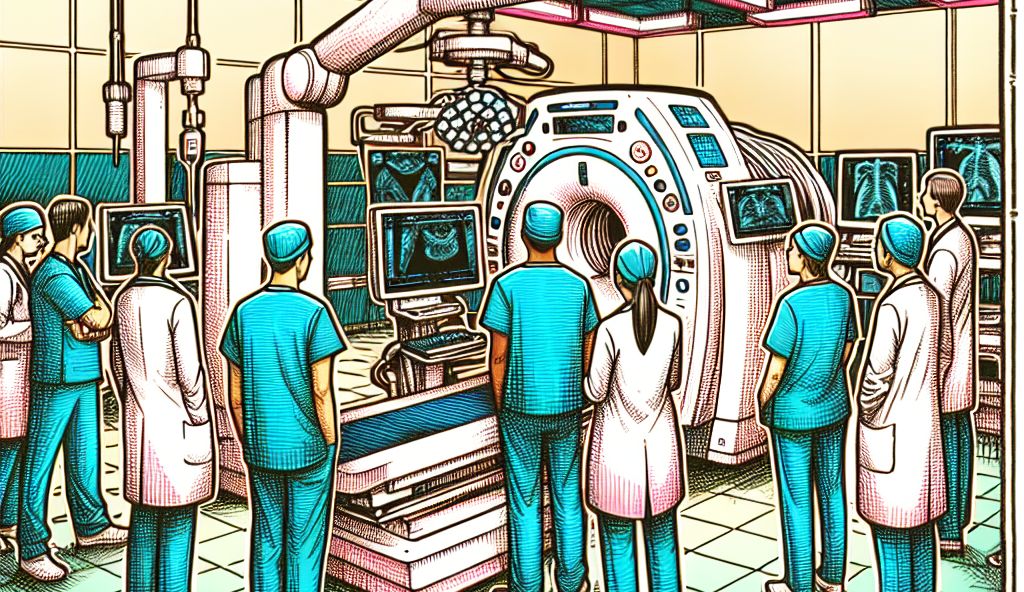
Networking is a crucial ingredient in the recipe for career growth and success, irrespective of the industry. For Fluoroscopy Technologists, the value of building a strong professional network cannot be overstressed. Fluoroscopy, a type of medical imaging that shows a continuous X-ray image on a monitor, is a specialized field. As such, the ability to connect with peers, mentors, and industry leaders can significantly enhance a technologist's knowledge, skill set, and job prospects. In this comprehensive guide, we will explore actionable networking tips tailored to Fluoroscopy Technologists looking to expand their professional horizons.
Understanding the Value of Networking
Before diving into the how-tos of networking, it's essential to grasp why it's so important. Networking within the field of fluoroscopy can lead to numerous benefits, such as staying updated with the latest technologies, learning about new job openings, and gaining insights into best practices. It's also an opportunity to exchange ideas and solutions to common challenges, and perhaps most importantly, it can pave the way for career advancement.
Establishing Your Professional Identity
The first step in networking is establishing your professional identity. This means knowing your expertise, interests, and goals within fluoroscopy. Are you interested in the technical aspects, patient care, or research and development? Defining these elements can help guide your networking efforts towards the right groups and individuals who share similar interests or can provide the guidance or opportunities you're looking for.
Create a strong online presence with a well-crafted LinkedIn profile that highlights your skills, professional experiences, and certifications. Join fluoroscopy-related groups on social media platforms and participate in discussions. This not only increases visibility but also demonstrates your passion for your field.
Attending Industry Events
Face-to-face interactions can leave lasting impressions, which is why attending industry conferences, seminars, and workshops is so beneficial. These events are often packed with potential contacts, including industry veterans, recruiters, and fellow technologists. Make a point to introduce yourself, exchange business cards, and follow up with your new contacts after the event.
Don't overlook the importance of local or regional professional associations. Becoming a member can provide access to exclusive events and resources that can bolster your networking efforts.
Engaging with Online Communities
Online professional communities offer a wealth of networking opportunities. Engage with peers and experts on platforms like LinkedIn, Twitter, and specialized forums dedicated to fluoroscopy or radiologic technology. Share your insights, ask questions, and contribute value to conversations. By doing so, you'll build your reputation as a knowledgeable and approachable professional.
Creating and Sharing Content
One of the best ways to gain exposure and connect with industry leaders is by creating and sharing content relevant to fluoroscopy. Write blog posts, articles, or social media posts discussing new techniques, industry trends, or your own experiences. Not only does this showcase your expertise, but it can also attract the attention of those with similar interests or those seeking insight.
Leveraging Alumni Networks
Do not underestimate the power of your alma mater's alumni network. Many professionals are eager to connect with fellow graduates, especially those from the same field. Reach out to your university's career center or alumni office to learn about networking events or online platforms where you can connect with alumni.
Volunteering and Professional Development
Volunteering at industry events or for professional organizations can put you in the middle of the action, allowing you to meet key players and contribute to your field. Additionally, continuing your education through certification programs or advanced degrees signals your commitment to your career and can introduce you to a cohort of like-minded individuals.
The Art of Following Up
After making a new contact, the follow-up is what solidifies the connection. Send a personalized email or message expressing gratitude for the conversation and suggesting a future touchpoint. Be prompt and sincere, and where possible, mention a specific topic or idea that was discussed to reinforce the connection.
Networking Pitfalls to Avoid
Networking is as much about what you shouldn't do as what you should. Avoid being overly aggressive or self-promotional. The goal is to build mutual relationships, not just to further your own agenda. Approach networking with the mindset of how you can help others as well as how they can help you.
Conclusion
For Fluoroscopy Technologists, effective networking can lead to a wealth of career opportunities and growth in expertise. The key is to be proactive, genuine, and consistent in your efforts, while also remaining open to learning and helping others. By following these tips, you'll be positioned to build meaningful connections that can propel your professional journey in fluoroscopy forward.
Frequently Asked Questions
1. Why is networking important for Fluoroscopy Technologists?
Networking is crucial for Fluoroscopy Technologists as it allows them to stay updated with industry trends, learn about job opportunities, exchange ideas, and pave the way for career advancement. It helps in expanding their knowledge, skill set, and professional connections.
2. How can I establish my professional identity for effective networking?
To establish your professional identity, identify your expertise, interests, and goals within fluoroscopy. Create a strong online presence, participate in relevant social media groups, and attend industry events to connect with like-minded professionals.
3. What are the benefits of attending industry events for networking?
Attending industry events provides opportunities for face-to-face interactions with industry veterans, recruiters, and peers. It allows you to make lasting impressions, exchange contacts, and stay updated with the latest developments in the field.
4. How can I engage with online communities for networking?
Engage with online professional communities on platforms like LinkedIn, Twitter, and specialized forums. Share insights, ask questions, and contribute value to conversations to establish yourself as a knowledgeable and approachable professional.
5. How can creating and sharing content help in networking?
Creating and sharing content relevant to fluoroscopy, such as blog posts or articles, can help you showcase your expertise and attract attention from industry leaders. It also provides a platform for sharing insights and connecting with professionals with similar interests.
6. What role do alumni networks play in networking?
Alumni networks can be powerful resources for networking. Reach out to your alma mater's alumni office to connect with fellow graduates in the field. Alumni networks provide opportunities for mentorship, collaboration, and expanding your professional circle.
7. How can volunteering and professional development contribute to networking?
Volunteering at industry events or for professional organizations allows you to meet key players in the field and contribute to your industry. Continuing education through certification programs signals dedication to your career and introduces you to like-minded individuals.
8. What is the importance of following up after networking?
Following up after networking is essential to solidify connections. Send personalized messages expressing gratitude and suggesting future interactions. Referencing specific topics discussed reinforces the connection and shows genuine interest.
9. What are some common networking pitfalls to avoid?
Avoid being overly aggressive or self-promotional in networking. Focus on building mutual relationships, offering help to others, and maintaining authenticity in your interactions. Networking should be a two-way exchange of value and support.
10. How can effective networking benefit Fluoroscopy Technologists in their career?
Effective networking can open doors to new career opportunities, collaborations, and knowledge sharing. It enhances professional growth, builds a supportive community, and positions technologists for success in the dynamic field of fluoroscopy.
Further Resources
In addition to the comprehensive guide on networking for Fluoroscopy Technologists provided above, here are some additional resources to further enhance your networking skills and expand your professional horizons:
1. LinkedIn Learning Courses on Networking:
LinkedIn offers a variety of courses on networking skills, building professional relationships, and maximizing the potential of your LinkedIn profile. Enroll in these courses to gain valuable insights and strategies for effective networking in the healthcare industry.
2. Radiologic Technologist Associations:
Joining associations like the American Society of Radiologic Technologists (ASRT) or the Association for Medical Imaging Management (AHRA) can provide networking opportunities, access to industry events, and resources for career advancement in the field of radiologic technology.
3. Networking Events in Radiology and Imaging:
Stay updated on upcoming networking events, conferences, and webinars specifically tailored to professionals in the radiology and imaging field. These events offer opportunities to connect with industry experts, explore career paths, and learn about the latest advancements in medical imaging.
4. Online Forums and Discussion Boards:
Explore online forums such as AuntMinnie.com and RadRounds.com, which are popular platforms for radiology professionals to engage in discussions, seek advice, and network with peers from around the world.
5. Books on Networking and Professional Development:
Invest in books like Never Eat Alone by Keith Ferrazzi and The Start-Up of You by Reid Hoffman to learn valuable networking strategies, building relationships, and advancing your career in the healthcare industry.
6. Professional Development Webinars:
Participate in webinars hosted by industry experts and organizations focusing on professional development, career growth, and networking tips specifically tailored to healthcare professionals.
7. Mentorship Programs:
Seek mentorship opportunities within the field of radiology and imaging to gain valuable insights, guidance, and support from experienced professionals. Mentorship programs can help accelerate your career growth and expand your professional network.
8. Online Courses on Medical Imaging:
Enroll in online courses on medical imaging, radiation technology, and fluoroscopy to enhance your knowledge and skills in the field. Platforms like Coursera, Udemy, and edX offer a range of courses led by industry experts.
Explore these resources, engage in networking activities, and continue to expand your professional connections to thrive in your career as a Fluoroscopy Technologist.

